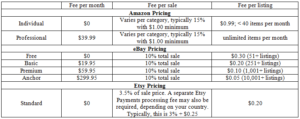Summary: Each online marketplace has its specific rules, requirements and audiences. So if you want to be sure you’re making the right decision, do some research before you start. At What a Figure! E-commerce Accounting we will help you to make the right choice.
Important things to consider before you start selling online on a marketplace:
1. Rules of the marketplace
Amazon does not allow you to create your own templates. Everything appears under a uniformed design, you can’t even link to your own webstore (even if you already have one). As a result, you won’t be able to develop your own brand. Keep it in mind if you start selling on the online marketplace.
Also, you won’t be allowed to sell certain groups of products. Before starting an e-commerce business you should also be aware of a list of prohibited and restricted products. For instance, Amazon has a quite long list of what you can’t sell on.
Another important thing to consider is listing rules you should follow. You are obliged to provide accurate and consistent information about your product. For example, don’t state that an item is “new” if it’s not, don’t indicate warranty if you are not authorized to offer it, etc. If you brake the rules your listing may be removed by the marketplace.
2. Fees
Make sure that you’re aware of all possible fees and charges in advance.
It’s important to determine whether the marketplace only charges on selling commission or they have a more complicated fee structure.
For example, most marketplaces charge listing fees. A listing fee is what a marketplace charges a seller to place an item for sale on it. It should vary depending on the duration of the listing and the number of categories in which the item was listed.
Pricing Comparison

3. The online marketplace’s traffic
As one of the biggest benefits of selling on an online marketplace is the ready-made customer base, before anything else I would recommend that you check the site’s traffic.
Evaluate the various levels of traffic to get a sense of how often your items could be viewed.
Top Online Marketplaces Websites Rating *
| Marketplace | Global Rank** | Leading country rank*** | Total visits | Avg. visit duration | Pages per Visit | Bounce Rate |
| Amazon | 14 | 4 (USA) | 2.06b | 06:54 | 8.50 | 37.15% |
| Ebay | 26 | 12(USA) | 790.48M | 07:15 | 8.13 | 35.86% |
| Aliexpress | 32 | 13 (Russia) | 520.11M | 08:25 | 9.36 | 32.54% |
| Rakuten | 40 | 7 (Japan) | 489.75M | 06:42 | 8.21 | 36.31% |
| Taobao | 44 | 5 (China) | 556.47M | 07:41 | 5.87 | 44.72% |
| jd.com | 74 | 7(China) | 322.48M | 05:06 | 5.90 | 38.85% |
| Flipcart | 86 | 6 (India) | 278.65M | 05:30 | 7.11 | 46.93% |
| Walmart | 90 | 23 (USA) | 305.65M | 04:13 | 4.68 | 52.49% |
| Allegro.pl | 99 | 6 (Poland) | 192.63M | 10:04 | 12.70 | 25.97% |
| Etsy | 117 | 39 (USA) | 208.32M | 06:09 | 6.73 | 46.91% |
| Alibaba | 173 | 126 (China) | 171.98M | 03:40 | 4.03 | 54.79% |
| Wish | 192 | 174 (USA) | 103.87M | 05:32 | 8.92 | 48.16% |
| Otto | 430 | 18 (Germany) | 51.72M | 05:58 | 10.05 | 37.94% |
*- data collected on SimilarWeb
** – traffic rank of site, as compared to all other sites in the world (eg. #1 being the site with the most traffic in the world)
*** – traffic rank of the site, as compared to all other sites in it’s leading country.
Bounce Rate represents the percentage of visitors who enter a site and then leave after visiting one page.
Use this metric to understand what is the “real” number of engaged visits, and to analyze the likelihood of a visitor to complete the website goal, in our case – complete a purchase.
4. Tools that can be integrated
Some of the most beneficial factors are the additional tools an online marketplace offers to ensure success for its sellers.
Some online marketplaces allow sellers to integrate social media with their shops or provide shop analytics that can be helpful for sellers to analyze the effectiveness of their business models. Other market places provide information and tips in order to educate their sellers on a variety of e-commerce topics and increase their chances of success.
Let’s take a look at the top e-commerce tools that can make your life easier.
Online Marketplace Optimization Tools Overview
Category | Tool | Short Description | Integration & Compatibility |
| Keywords&Ranking | AMZ tracker | Its features include product promotion, sales tracking, negative review alerts, competitor analysis, and more. | Amazon |
| Merchant Words | It offers full-service keyword research, and listing optimization services; custom data analytics. | Amazon | |
| Sonar | Sonar is a free Amazon keyword research tool. | Amazon | |
| Inventory management | Brightpearl | Includes financial management, inventory and sales order management, CRM, purchasing and supplier management, fulfilment and logistics. | Amazon, eBay, Walmart, Jet, Newegg |
| Sellbrite | Helps to list inventory on multiple channels, automatically update listing, sync inventory to prevent overselling | Amazon, eBay, Etsy, Walmart, Jet, Sears, Newegg, Rakuten | |
| Stitchlabs | Provide a visibility across multiple sales channels, stock locations, and stages of the product life cycle | Amazon, eBay, Etsy | |
| Pricing solutions | Feedvisor | Analyze your competitive landscape and apply the optimal pricing, balancing sales revenue and profitability. | Amazon |
| Price Checker 2 | Will let you scan 18.000 items per hour in search for the best product opportunities on your wholesalers product list. | Amazon | |
| Provides ѕtrаtеgіс рrісе аutоmаtіоn, competitive insight, and dаtа analytics tо оnlіnе retailers. | Amazon, eBay, Fnac | ||
| Product launch/Feedbacks | Jungle Scout | Online solutions for tracking products, exploring product opportunities and ideas, monitoring competitor sales data, and more | Amazon |
| xSellco | Easily respond to your customers’ queries related to products, prices, order, shipping, and much more. | Amazon, eBay | |
| Viral Launch | Helps you to find profitable products that you can sell: historical trends, monthly sales, monthly revenue, number of sales for the past 12 months, and much more. | Amazon |
The absolute leader in a variety of tools that can be applied is Amazon. Dozens of applications were developed solely for Amazon sellers. You can check all of these here. Obviously, it will cost you some money but the right tools are always worth it.
5. The online marketplace’s support
The opportunity to get support for some e-commerce sellers is a crucial point while choosing a marketplace. Obviously, you want to concentrate all your attention and efforts on growing your e-commerce business but not on solving tech issues.
Here are the typical ways you can reach out to a marketplace:
Email – this is great when you have a question but don’t need help right away and can wait for a reply.
Phone – sometimes verbal communication is the most efficient way to solve the problem.
Live Chat – nowadays, became more and more popular as gives immediate assistance (not available on eBay).
Here is an example of Etsy’s support page:

It is important for you to be able to get in touch with a support team if you ever have something go wrong. You should concentrate on doing business instead of spending ages on solving tech problems. Marketplace’s support must be efficient and fast.
Pros and cons of selling on an online marketplace
Advantages of selling on a marketplace:
- There is already traffic on the marketplace, so the chance that your potential customer will find the product you propose is much higher. Also, it will help you reduce your marketing costs.
- Easy to start. To create a seller profile and list your products, it is not a complicated task, you can do it quite fast. Furthermore, if you register as an individual in the beginning it will not cost you a lot.
- Trust between the buyers and you. For example, potential customers might rather make a purchase from Amazon than from an unfamiliar website.
Disadvantages of selling on a marketplace:
- There are lots of rules you should follow, therefore you are not independent. Selling certain groups of products sometimes requires prior approval. Also, you should consider policies for writing listings and even product image requirements. You cannot do SEO for your own brand or product exclusively on marketplace sites. You do not have any direct control of the pages where your products are shown. Furthermore, marketplaces always have their own refund policies which can conflict with your own policy.
- Higher competition. You have to compete with different sellers inside the marketplace who sell the same product like yours.
- It’s hard to build your own client base. Shoppers mainly visit marketplaces to search for the lowest price; they are less interested in high quality or unique products. Therefore, they visit occasionally and buy any product if it has a large discount. Consequently, there is no guarantee that the customer will come back to buy again from you.
- You won’t be able to communicate with your buyers, it’s hard to make any research in this area, and consequently to create and use a marketing strategy.
However, marketplaces propose different options of selling now: you can create your own store on the marketplace. In this way they empower brands, and creative content.
We hope this article helped you to choose the right online marketplace for your business. If you have any questions or other suggestions, please let us know in the comments below!
Read next: Web store: 7 must-have features for success

